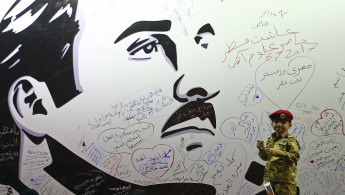Qatar downplays CNN leaks of Riyadh-agreement stating that the current crisis bears 'no relation'
Qatar says it abided by commitments under the 2013/2014 Riyadh agreements that may have been leaked by blockading countries to embarrass Doha, insisting new demands bear no relation to agreements.
4 min read
The blockade has rallied Qataris around their tiny nation in a show of defiance [AFP]
A few hours before US Secretary of State Rex Tillerson was due for Gulf crisis talks in Doha, CNN published a content of agreements signed by Qatar in 2013-2014 with the current blockading countries.
CNN said the agreements – where details, but not the existence were hitherto secret – had been leaked to the US media network by a "source in the region."
The gist of the agreements signed by Qatar and the Gulf countries is already known to the public. It included a joint commitment to Egypt's stability, a mutual pledge not to support "antagonistic media," and barring support of the Muslim Brotherhood, as well as groups in Yemen and Saudi Arabia that pose a threat to the security and stability of the Gulf Cooperation Council.
CNN said the agreements – where details, but not the existence were hitherto secret – had been leaked to the US media network by a "source in the region."
The gist of the agreements signed by Qatar and the Gulf countries is already known to the public. It included a joint commitment to Egypt's stability, a mutual pledge not to support "antagonistic media," and barring support of the Muslim Brotherhood, as well as groups in Yemen and Saudi Arabia that pose a threat to the security and stability of the Gulf Cooperation Council.
The agreements did not single out Qatar, as the provisions applied to all countries who signed it.
The leaks follow the same pattern seen previously with the hacking of the Qatar News Agency that triggered the current crisis with Saudi Arabia, the UAE and Bahrain, and the subsequent launch of the three-country blockade of Qatar.Although the origin of the leaks was not identified, a statement posted by the official Saudi Press Agency minutes after CNN's report suggests that the blockading countries intend to use the substance of the documents to put immediate pressure on Qatar amid US-Kuwaiti efforts to resolve the crisis.
|
The blockading countries' statement said the ultimatum posted to Qatar was to force it to abide by the agreements, stating that their 13 demands – which contrary to the earlier agreement single out Qatar by calling for the closure of media outlets and dictating on Qatar's diplomatic and military relations – were "in the spirit" of the original agreements.
| Read more: Why some Arab countries want to shutter Al Jazeera |
Although Saudi and Emirati media quickly pounced on the leaks as 'damning' for Qatar, Doha downplayed their significance, insisting it has abided by its commitments and stressing that the 13 demands were a violation of its sovereignty and were themselves a violation of the agreements in question.
In response to CNN questions, a Qatari spokesman said in a statement that it was Saudi Arabia and the UAE who "have broken the spirit of the agreement."
"A full reading of that text will show that the intent of the 2013/14 agreements was to ensure that sovereign GCC nations be able to cooperate within a clear framework," said Sheikh Saif Bin Ahmed Al-Thani, director of Qatar's government communication office.
"Their demands – that Qatar close down Al Jazeera, force the breakup of families, and pay 'compensation' – are demands that bear no relation to the Riyadh agreements," he added.
"Further, at no point did Saudi Arabia or the UAE use the mechanisms in the Riyadh agreement to communicate their concerns to Qatar," he said, confirming that Qatar had not received any request or complaint.
'Leak as a tactic'
Al-Thani said that the current list of demands put to Qatar "represent an unwarranted and unprecedented attack on Qatar's sovereignty, and it is for that reason that they have been rejected by Qatar and condemned by the international community."
|
"This crisis was triggered by a hacking, fabricated statements and a coordinated media campaign against Qatar," he said.
"From the beginning, Saudi Arabia and the UAE have attempted to conceal facts from the general public, including their own citizens, going so far as to block Al Jazeera and other media outlets within their borders."
Pro-Saudi think tank, the Arab Foundation, said the leaks indicate that "the Saudi-led quartet have exhausted their patience with Qatar and any attempt by the Qatar government to deny its commitments or backtrack on its repeated pledges will no longer be tolerated."
However, as Tillerson arrived in Doha for talks on Tuesday on the second leg of his four-day trip to the Gulf to help seek a resolution to the ongoing crisis, other commentators suggest the leaks could be intended to pile pressure on Doha and even obstruct the efforts of the US secretary of state.
Indeed, as Tillerson's adviser R.C. Hammond said the package of demands issued by Qatar's neighbours was not viable, the blockading countries have responded by reiterating the ultimatum in the SPA statement, alleging the demands were part of the agreement signed by Qatar.
“The leak of Riyadh agreement 2013 confirms that the siege countries are using [leaks] as a tactic; they already leaked the conditions used to subjugate the State of Qatar," said Sheikh Abdulrahman bin Hamad al-Thani, CEO of the Qatar Media Corporation.
The leaks are "an expression of bankruptcy and ill intent, and reflect Abu Dhabi and Riyadh's unwillingness to resolve the crisis and continue to escalate and interfere in Qatari affairs," wrote Basheer al-Bakr, editor in chief of Al-Araby al-Jadeed.





 Follow the Middle East's top stories in English at The New Arab on Google News
Follow the Middle East's top stories in English at The New Arab on Google News
![Israeli forces ordered bombed Gaza's Jabalia, ordering residents to leave [Getty]](/sites/default/files/styles/image_330x185/public/2176418030.jpeg?h=a5f2f23a&itok=_YGZaP1z)

